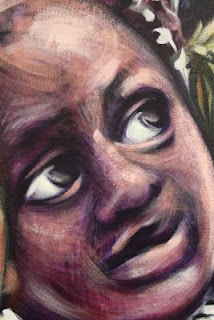Language to language
our words in different lands
speak to each other
call to each other
sister brother blood
the solution is our words, our place
hear each other talk
hear each other walk
hear each other
the same words the same
listen
to our tongues
divide the sylabbles
to unite the wind, to share the howling
the answer the reply the mirror the shadow my sun
the topography of your tongue
my words are in yours
my anger my muddiness my crystalline ink
in your language your place.
Rescue yourself
rescue community
rescue the land
rescue all our relations
wind, dust, water, suns
ancestral flesh
ancestral bones
a commune of the tongue
rescue time
rescue space
rescue our cosmic skin
hang the moon
on our tongue
rescue the imprisoned
recue the freedomed
rescue our words,
our words: word,
the skin of our struggle,
our world.

Rescue
each other's silence
record each others imprint, growl, guttural scribbles
grabar engrave tatoo transparent skins
grape-words that can be gently squeezed out of their skins
listen to each other we say the same things
differently.
We succumb to each other, we feed each other, we clothe,
we heal, we love, we abandon each other, we
cry, we dream each other, we haunt each tother
we wake each other, we remember, we forget,
we impress each other, we are made of each other, we
fight each other, we make up, we feel each other, we disappear and reappear
we lust over each other,
we need each other, we can't live without words,
with words, each other, with words or
their silent stares or aging silence
or new-born echoes. Our words are our food,
the only food with no obesity or obsolescence or
obsidian gushes that split open the tongue.
We wreck each other's words or we become one,
a tiny wound of immutable love or a wound that overcomes.

Our words are maps, topography, flesh offerings,
molecules of our being. Language herself finds
her counterparts in other and other's languages.
Language is the sister of water. Language rolls
down and rolls, waves, shells, along the ground
of our tongues and consciousness to purify herself,
to rid herself of
any subjectivities that might kill her or lead to suicide
and objects extraneous to herself or she ingests them,
gestates them into new verbal wings. Language
too coughs and wheezes, clears her throat,
syllabilizes, rolls and waves off our tongues
to become consciousness, in order to change the world or,
in our case, to restore ourselves to put place in the natural world
-- not to its redeeming past -- to a new world where
humans are subordinate once again, offspring
caring of the earth. Then the words take on
their opponents with salival ease: hopelessness,
imprisonment has no chance with language's
hopefulness, liberty -- preferable to but mentor to
free-dom, free-with boundaries, with hierarchy-dom,
whereas being free, is being boundless, liberated. Poets,
free poets, resistance poets, alternative poets, organizer poets, activist poets, community-based poets
have to first ride their tongues to struggle and
to offer clarity, flesh, sisterhood, contradiction, muddy waters,
ears that kiss, listening that fasts, scraped lungs, calloused eyes, attentive
hearts, risk everything to face the microchip-industrial
information-electronic web complex so that she would
be herself again, so that we could speak again
with the land, with ourselves.
[Excerpt from my diary and notes taken down in conversations, meetings and other human formations during travel in Johannesburg-Durban, South Africa. August 2001.]
Excerpts of a painting commissioned by the National Network for Immigrant and Refugees (NNIRR), by Daniel Camacho, for the NNIRR delegation that participated in the U.N. World Conference against Racism held in Durban, South Africa, August-September 2011.


No comments:
Post a Comment